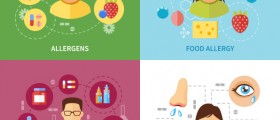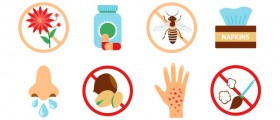
Allergy is a hypersensitivity disorder of the human immune system. Hypersensitivity disorders are undesirable reactions produced by the normal immune system. Allergy occurs whenever the human immune system mistakenly thinks that a normally harmless environmental substance is an invader, dangerous for the health. Allergy is characterized by rapid and excessive activation of specific white blood cells by a type of antibody known as IgE. This process results in intense inflammatory response and triggers a chain of associated symptoms.
Eczema
Eczema is a form of dermatitis, which is characterized as the inflammation of the skin. This is a common allergic reaction to specific allergens or irritating substances. It is characterized by the itchy rash and is particularly noticeable on the head and scalp, neck, insides of elbows, behind the knees, and on the buttocks.
Urticaria
Urticaria is a rash also known as Hives. It manifests as pale red, raised and itchy patches of the skin. Hives is frequently caused by allergic reactions to food or medicine. Substances that usually trigger hives are animal dander, insect bites, pollen, medications, shellfish, fish, nuts, eggs, milk, and other foods. The rash occurs as the body releases histamine and other chemicals into your bloodstream, triggered by the allergic substance.
Allergic rhinitis
This condition is also known as pollenosis or hay fever. It is characterized as an allergic inflammation of the nasal airways that occurs when the patient inhales an allergen, usually pollen or dust. The allergen triggers the production of antibody, which starts the chain releasing the inflammatory mediators such as histamine. The symptoms include itching, swelling, and mucus production. People living in urban and air-polluted areas are at a higher risk of allergic rhinitis.
Asthma
Asthma is a chronic inflammatory disease of the airways characterized by wheezing, coughing, chest tightness, and shortness of breath. Certain triggers such as different allergens and irritants are usually responsible for asthma attacks. In some patients, the only symptom present is coughing.
Food allergy
Food allergies are severe reactions of the immune system to proteins found in food. Food allergy may have the same symptoms as food intolerance, but the pathology of the condition is quite different. In food allergy, the immune system reacts upon the ingestion of particular foods, mistakenly believing that the protein is a harmful substance. The allergic reaction is the body’s way to fight against the invader. Allergic responses to food usually include dermatitis, gastrointestinal and respiratory distress, or more severe anaphylaxic responses as biphasic anaphylaxis and vasodilation.
Insect allergy
Uncomfortable allergic reactions may sometimes appear after the patient has been bitten or stung by an insect. Wasps, bees, hornets and ants or mosquitoes and ticks typically cause these allergies. The allergy occurs as a reaction to the insect venom. Usually, the reaction involves changes on the skin, but in anaphylactic patients, the response is more aggressive leading to a systemic reaction where the response progresses from the sting site around the whole body. This potentially fatal situation requires immediate medical help.
















-Causes,-Symptoms-And-Diagnosis_f_280x120.jpg)
Your thoughts on this
Loading...